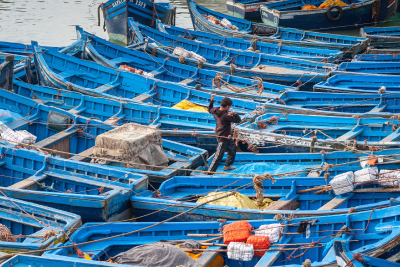The pandemic is inflicting economic and social harm on those working in fisheries sectors, but it opens a window to make seafood industries more sustainable.
Measures to curb the spread of COVID-19 have hit fishers hard, but on the other hand the crisis may offer opportunities to make fishing industries more sustainable, according to a new UNCTAD report on the pandemic’s impacts on the blue economy.
Before the pandemic struck, exports of fisheries products had seen strong growth, increasing by 11% from $136 billion in 2013 to $152 billion in 2017, with more than 50% originating in developing countries.
But exports for 2020 are expected to drop by at least one third, with global demand down due to the pandemic, which has left many restaurants and hotels closed or empty for weeks or months.
“2020 will surely be a very difficult year for the fisheries sector,” said David Vivas, an UNCTAD legal officer working on trade and environmental issues. This is especially true for the world’s 9.4 million fishers, 90% of whom live in developing countries.
Steep plunge in prices and supply
Shrimp, for example, are selling for a mere 10% of their normal price in certain ports in northern Spain. Similarly, dramatic price drops have been registered for fresh salmon, trout and cod exported from northern Europe and Chile to North America.
Massive flight cancellations have hurt trade in some high-end fresh seafood products. Maldivian tuna exports to Europe, for example, have been halted. Argentina’s fish and seafood exports to Spain, Italy and China have fallen by 30% since the outbreak. And Indian shrimp consignments to China have dropped by 10% to 15%.
The pandemic is also affecting supply, with economic restrictions keeping many boats anchored in ports.
In the Mediterranean alone, the catch has collapsed by about 80%. The region’s confinement measures have hurt small-scale fishers the most, with less than 10% of their vessels currently casting nets.
For coastal communities, such as those living in the Mediterranean region or in small island nations, fishing is their lifeline. Tourism, which has also been heavily affected by the pandemic, tends to be the only economic alternative for fishers in these countries.
“If demand doesn’t pick back up,” Mr. Vivas said, “the social consequences could be devastating.”
Flip side: a lifeline for fish stocks
But COVID-19’s effects on the supply of and demand for fisheries products could offer the globe’s oceans, seas and rivers an opportunity to replenish. Recent United Nations research has revealed that about 31% of global fish stocks are currently below sustainable biological levels.
Much of the overfishing has been supported by governments through subsidies that make it cheaper for industrial fleets to hunt for fish.
“There is no doubt that fuel subsidies play a big role in chronic overfishing,” Mr. Vivas Eugui said.
Yet despite the fact that oil prices hit a 25-year low in April, governments continue to pour into the sector oil and other capacity-enhancing subsidies that are estimated at about $10 billion in OECD member countries and potentially above $20 billion worldwide.
“Now is the time for governments to rethink how they support fisheries sectors,” Mr. Vivas Eugui said, “and shift from subsidies that enhance the capacity of industrial fleets in favour of more support for responsible small-scale fishers as well as measures that encourage sustainable stock management and improve fishing traceability.”
Such a shift would help not only to reverse the overexploitation of fish stocks but also to tackle illegal, unreported and unregulated fishing, which may have increased recently in certain regions due to less surveillance of the oceans during the pandemic.
Policy recommendations
The report calls for COVID-19 response measures to include support to small-scale fishers, many of whom are self-employed and don’t have income or health insurance.
As many have been sidelined during important fishing seasons, the risk is that millions of fishers won’t be able to sustain their families, afford operational costs or repay outstanding loans for equipment.
In order to help fishers, especially small-scale operators, to compensate for the lack of commercial activity during the confinement period, UNCTAD recommends that governments extend fishing seasons when feasible, if the total catch remains below the maximum sustainable yield and if doing so wouldn’t disrupt fish reproductive periods.
In addition to extending the season and phasing out capacity-enhancing subsidies, the report provides the following policy recommendations:
Keep up the fight against illegal fishing, relying as much as possible on electronic monitoring and surveillance systems supported by targeted inspections and missions at sea and in ports.
Exercise due restraint in scaling up trade protectionism disguised as sanitary measures in seafood value chains.
Support the transition from fresh fish to value-added processed seafood products where feasible, to offer new economic opportunities to those working in the sector.
Enhance coordination between fish and seafood suppliers and transport, warehousing and logistical services to minimize loss of produce and food waste.
Better management of blue economic sectors, which include tourism and maritime transport, is essential to achieving the objectives of the 2030 Agenda for Sustainable Development, in particular goal 14, which seeks to conserve and sustainably use oceans, seas and marine resources.

